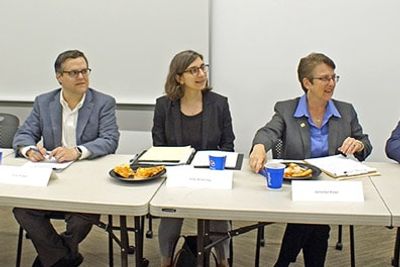Story by Jeff Kronenfeld, July 2019 Issue.
Photos by Bill Gemmill
The
American Constitution Society (ACS) hosted a panel exploring current and past
cases that impact LGBTQ rights and potentially the rights of other marginalized
groups as well. Held on June 6, the panel was made up of lawyers involved in
some of these cases, plus Nate Rhoton, the executive director of one•n•ten, a
non-profit in downtown Phoenix serving LGBTQ youth. Though much progress has
been made on LGBTQ rights during the preceding decades, the anti-LGBTQ policies
of the Trump administration and the rightward shift of state and federal courts
had most of the panelist concerned if not fearful for the future.
The panel — titled Brush and Nib and
Beyond: New Frontiers in LGBTQ Rights — was moderated by Randy McDonald, an
attorney with the law firm Perkins Coie, one of the event’s sponsors. He began
with a question to Eric Fraser, an attorney who argued on behalf of the City of
Phoenix’s anti-discrimination ordinance in front of the Arizona Supreme Court
in January. That case was brought by a small wedding stationary company with
help from the Alliance Defending Freedom (ADF), the latter of which is
identified by the Southern Poverty Law Center as an anti-LGBTQ hate group and
is headquartered in Scottsdale. The ordinance protects people from
discrimination by businesses on the basis of race, national origin, sex,
marital status, religion and other characteristics.
Phoenix’s public accommodation ordinance
was originally passed in 1963, but was amended in 2013 to include sexual
orientation, gender identity or expression, and disability. The stationary
company, named Brush and Nib and operated by Joanna Duka and Breanna Koski,
claimed that the ordinance violated their constitutional rights by preventing
them from stating that they refuse to offer LGBTQ couples the same service as
heterosexual ones on their website. “What makes this interesting, I think, is
that no same-sex couple had ever requested services from this company before
they sued,” Fraser said.
This marked the Brush and Nib case out from
the raft of similar challenges to anti-discrimination ordinances and laws
across the nation, many of which are also bankrolled and argued by the ADF.
Though the city won in lower courts, ADF attorneys filed a petition that
brought the case before the Arizona Supreme Court. The city filed a petition
arguing their opponents did not have standing, which the Supreme Court
initially rejected, then reversed its decision just before oral arguments.
“They wouldn’t let us file any more briefings on the issue, which is weird,” Fraser
explained. “That would be a way to dodge this issue, as we know the U.S.
Supreme Court dodged the main issue in Masterpiece Cakeshop [a case from
Colorado where a baker refused to make a cake for a same-sex wedding], but
there really weren’t many questions about it at oral argument, so I’m not sure
whether that’s the way they’ll go or not.”
Also discussed were several related cases
involving a range of other wedding services, everything from cakes to flowers
to video editors. The Supreme Court for the state of Washington conveniently
decided one such case the morning of the panel. Ingersoll v. Arlene’s Flowers
involved a same-sex couple who sued a florist for refusing to provide flowers
for their wedding. The morning’s ruling was a reconsideration of the case in
light of the U.S. Supreme Court’s decision on the Masterpiece Cakeshop case and
reconfirmed the earlier decision in favor of the same-sex couple.
Though the ADF’s argument was rejected, the
organization seems likely to continue its crusade in support of discrimination.
“The arguments are very similar in many of these cases and [the ADF] seem[s] to
have been trying different places to advance their legal arguments,” explained
panelist Jennifer Pizer, the law and policy director for Lambda Legal, a national
legal organization advocating for LGBTQ people’s civil rights. [JW2]
Another panelist, Julie Wilensky, a senior
staff attorney for the National Center for Lesbian Rights, discussed a recent
victory for LGBTQ youth in Arizona that demonstrated how legal proceedings can
help prompt political solutions in addition to legal ones. She was one of the
attorneys involved in a recent case that challenged Arizona’s so-called “No
Promo for Homo” Law, which passed in 1991 and banned schools from including positive
or even medically accurate discussions of homosexuality in HIV/AIDS education.
The suit
challenged the 1991 law on the grounds of an equal protection claim and
outlined how it directly harmed LGBTQ youths. The suit resolved soon after the
state legislature repealed the challenged law. Another important component in
passing the repeal, which had been attempted several times in recent years, was
the criticism of the 1991 law by new Superintendent of Public Instruction Kathy
Hoffman. “Within two weeks [of the suit being brought] the law had been
repealed,” said McDonald, the moderator. “In Arizona state politics, that’s
basically the speed of light.”
Despite
these and other recent victories for LGBTQ rights mentioned, the discussion
seemed more dominated by concerns and fears for the future. However, whatever
may come, the panelists also seemed resolved to continue the fight. “My
takeaway today is that there is still so much more work to do,” said Rhoton.
“It’s scary, the potential for backslide, but also how interconnected the
various civil rights protections and codes are and how a quote-unquote bad
decision, as it pertains for LGBTQ rights and issues, could impact so many
marginalized communities across the nation and truly disrupt the fabric of our
nation.”
